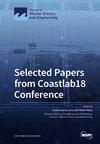用于实验室连续监测码头冲刷的新型 3D 结构光扫描仪技术
IF 2.8
3区 地球科学
Q1 ENGINEERING, MARINE
引用次数: 0
摘要
实验室实验对于了解嵌入式结构周围的冲刷情况至关重要。然而,目前还没有标准可靠的仪器来监测实验室中这一物理过程的进展。本文展示了一种新型三维结构光扫描技术在不间断水流中连续测量冲刷床地形的能力。为操作该设备,开发了一套合适的数据处理程序。与其他方法相比,由于采用了自动云重建技术,数据处理速度更快。这种技术不仅速度快,而且可以获取垂直空间精度高的数据。作为基准测试,在清水中的沙质圆形码头上进行了水槽测试,以验证该技术的有效性。扫描仪观察到的结果与文献报道的结果一致。局部冲刷发生在靠近码头的两侧。最终测得的最大冲刷深度几乎等于码头直径。在测试的水力条件下,这项技术被认为是非侵入性的,与其他设备相比,它的局限性很小。本文章由计算机程序翻译,如有差异,请以英文原文为准。
Novel 3D Structural-Light Scanner Technique for Continuous Monitoring of Pier Scour in Laboratory
Laboratory experiments are crucial for understanding scour around embedded structures. However, there is currently no standard and reliable instrumentation for monitoring the progression of this physical process in laboratory. In this paper, the capability of a novel 3D structural-light scanner technique to continuously measure the scour bed topography in uninterrupted flow is demonstrated. A suitable data processing procedure is developed to operate this device. Data processing is faster compared to other methods due to the automatic cloud reconstruction. This technique is rapid and allows for data acquisition with high vertical spatial accuracy. Flume tests are conducted on a circular pier founded in sand in clear water, as benchmark tests, to validate the effectiveness of this technique. The results observed with the scanner were coherent with those reported in the literature. Local scour initiation occurred near the sides of the pier. The maximum final scour depth measured was nearly equal to the pier diameter. This technique is considered non-intrusive under the tested hydraulic conditions and presents few limitations compared to other devices.
求助全文
通过发布文献求助,成功后即可免费获取论文全文。
去求助
来源期刊

Journal of Marine Science and Engineering
Engineering-Ocean Engineering
CiteScore
4.40
自引率
20.70%
发文量
1640
审稿时长
18.09 days
期刊介绍:
Journal of Marine Science and Engineering (JMSE; ISSN 2077-1312) is an international, peer-reviewed open access journal which provides an advanced forum for studies related to marine science and engineering. It publishes reviews, research papers and communications. Our aim is to encourage scientists to publish their experimental and theoretical results in as much detail as possible. There is no restriction on the length of the papers. The full experimental details must be provided so that the results can be reproduced. Electronic files and software regarding the full details of the calculation or experimental procedure, if unable to be published in a normal way, can be deposited as supplementary electronic material.
 求助内容:
求助内容: 应助结果提醒方式:
应助结果提醒方式:


